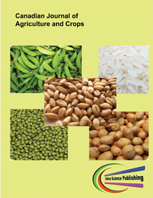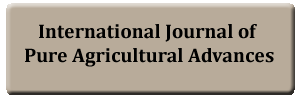Plant Growth Promotion and Suppression of Damping Off in Tomato by Plant Growth Promoting Rhizobacterium Bacillus amyloliquifaciens
DOI:
https://doi.org/10.20448/803.5.1.59.68Keywords:
PGPR, Seed germination, Vigor, Shoot growth, Root growth, Leaf number, Chlorophyll, Root colonization, Antagonist, Seedling mortality.Abstract
Plant growth promoting rhizobacterium (PGPR) is a kind of rhizosphere bacterium that increases plant growth and yield by intimately colonizing plant roots. This study was planned to examine the effect of a PGPR strain namely Bacillus amyloliquifaciens PPB10 on growth of tomato plants and suppression of damping off disease caused by Sclerotium rolfsii. In this study tomato seeds were treated with PPB10 and sown in sterilized soil. The PGPR isolate PPB10 significantly improved seed germination and seedling vigor of tomato plants compared to non-treated control. Three weeks after sowing, plants treated with the PGPR strain displayed significantly enhanced levels of growth in terms of length and yield of shoot and root biomass compared to non-treated control plants. Seed bacterization with the PGPR significantly increased total chlorophyll contents in the shoot. Moreover, the isolate significantly antagonized the mycelial growth of the pathogen Sclerotium rolfsii, while treating tomato seeds with the bacterium significantly suppressed damping off disease. The isolate was found to be an efficient colonizer of the tomato roots. Since the PGPR B. amyloliquifaciens PPB10 displayed traits beneficial to the plants, it has the potential to be utilized in the development of an effective seed treatment.


